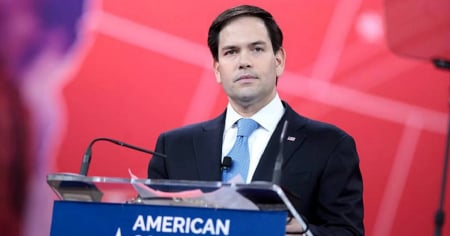The Republican senator Marco Rubio, nominated by Donald Trump as the next Secretary of State of the United States, described the regime of Nicolás Maduro on Wednesday as a drug-trafficking organization that has taken control of Venezuela.
Rubio made these statements during his confirmation hearing before the Senate, where he also expressed concern about the growing influence of Iran in the South American country, reported Infobae.
"Unfortunately, Venezuela is not governed by a government. It is governed by a drug trafficking organization that has taken control of the national state, and we have seen, I believe, that more than seven, eight, or nine million Venezuelans have left the country. And more people are expected to leave the country," stated the Republican senator.
Rubio, who will be the head of U.S. diplomacy if his nomination is confirmed, harshly criticized the Joe Biden administration for supporting negotiations between chavismo and the Venezuelan opposition.
According to him, these conversations were manipulated by Maduro to legitimize his regime. "They entered into negotiations with Maduro. He agreed to hold elections, and the elections were completely a farce," Rubio stated.
The senator also denounced how the Venezuelan regime has used migration as a weapon to pressure the United States and obtain economic concessions.
He mentioned, for example, that companies like Chevron have made significant financial contributions to the Maduro regime after obtaining general licenses, without the chavismo fulfilling the promises made in the negotiations.
Furthermore, Rubio warned about the presence of foreign powers in Venezuela, including Russia and Iran.
According to the senator, the Iranians have started building drone factories in the region, which poses a direct threat to hemisphere security.
"In fact, the Iranians are exploring or are beginning to build Iranian drone factories in our own hemisphere, not to mention the long-standing practice of the Venezuelan regime of providing legitimate but illegitimate passports to Hezbollah agents in our own hemisphere," he warned.
Rubio emphasized the need to reassess the current strategies towards Venezuela and to strengthen measures against the Maduro regime, in a context where the influence of external actors threatens the stability of the region.
During his speech before the Senate, Rubio also emphasized the threats posed by narco-terrorism and dictatorial regimes in the Western Hemisphere.
One of the most representative examples is in Venezuela, where Maduro swore in last Friday as president of that country for a new six-year term, in a ceremonial event held at the National Assembly in Caracas.
In this way, he was illegitimately sworn in for a third consecutive presidential term, in an act rejected by a large part of the international community due to the lack of transparency and legitimacy in the electoral process held at the end of July 2024 in the South American nation.
The Venezuelan opposition leader Edmundo González spoke out this Friday on social media, where he denounced that Nicolás Maduro's regime has consolidated a coup d'état in the country.
González, who represents the opposition and has been recognized by millions of Venezuelans as the legitimate president, stated on the social media platform X that he will defend the popular will expressed at the polls.
Additionally, last Monday, the Venezuelan opposition party Primero Justicia (PJ) warned that Nicolás Maduro, along with his allies from Cuba, Miguel Díaz-Canel, and from Nicaragua, Daniel Ortega, form an anti-democratic axis that, along with Russia, Iran, and China, poses a threat to peace in the West.
Through a statement shared on the social network X, the opposition party, one of the most important in the country, warned about what it sees as an "authoritarian escalation" in the region following Maduro's inauguration, whom they consider an illegitimate president.
Frequently asked questions about Marco Rubio's statements on Venezuela and their impact on international policy
What has Marco Rubio declared about Nicolás Maduro's regime in Venezuela?
Marco Rubio has described Maduro's regime as a drug trafficking organization that has taken control of the country. During his confirmation hearing before the Senate, Rubio stated that more than seven million Venezuelans have left the country due to this situation. He also criticized the negotiations between chavismo and the opposition, arguing that they have been manipulated by Maduro to legitimize his regime.
What is Marco Rubio's stance on the influence of foreign powers in Venezuela?
Marco Rubio has raised concerns about the presence of foreign powers, such as Russia and Iran, in Venezuela. According to Rubio, Iran has begun constructing drone factories in the region, posing a direct threat to hemispheric security. This type of external influence is seen by Rubio as a destabilizing factor that exacerbates the situation in Venezuela and throughout the region.
How does the United States' foreign policy towards Venezuela affect its relationship with Cuba?
The U.S. foreign policy towards Venezuela, led by figures like Marco Rubio, also impacts the relationship with Cuba. Rubio has been a fierce critic of the Cuban regime, which is an ally of Venezuela, and has advocated for stricter sanctions against both countries. Rubio's influence could signify a hardening of policies towards these regimes, affecting bilateral relations and stability in the region.
What criticisms has Marco Rubio made of Joe Biden's administration regarding Venezuela?
Marco Rubio has criticized the Biden administration for supporting negotiations between chavismo and the opposition in Venezuela. According to Rubio, these talks were manipulated by Maduro to legitimize his regime without making significant changes. Furthermore, Rubio has denounced how the Venezuelan regime has used migration as a political weapon to pressure the United States.
Filed under:
